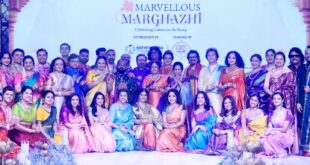Moscow is a multicultural city. It is home to 13 million people, and only about half of them are native Muscovites. The capital attracts residents of smaller Russian cities, as well as immigrants from CIS countries, Middle Asia, Europe and even India, with its opportunities both for education and career development, and for a rich cultural life. The Indian diaspora in Moscow numbers about 15,000 people. Many come to Moscow to get higher education and stay on, finding good jobs in their specialty, doing business and building families.
Indian culture has taken root in modern Moscow
Muscovites are interested in Indian culture and are happy to adopt some of the festivals and traditions. In recent years, there have been numerous festivals of Indian culture in the capital, bright Holi celebrations are organized in parks, and young women often decorate themselves with mehendi. Muscovites who lead an active lifestyle have come to appreciate yoga and various forms of meditation as practices that help to harmonize themselves and fill their lives with joy and inspiration, to find a fulcrum within themselves. However, yoga with a Moscow accent may differ from the Indian tradition. Often Moscow yoga implies the presence of curious attributes, such as brightly colored leggings, a mat decorated with the phases of the moon, the use of incense palo santo. The decor of decent yoga clubs necessarily includes aged statues of Ganesha or Buddha’s head. It is also very desirable after practice to go to a trendy smoothie bar with a friend to chat about the finer things and signs the universe gives us.
Indian cuisine
In Moscow you can find restaurants of almost every cuisine in the world. Muscovites are great gourmets and enjoy trying different flavors. As a rule, most people do not dine at home. Businessmen and office workers go to cafes and restaurants for lunch and meetings. There are many Japanese, Italian, Vietnamese, Georgian, Chinese establishments in the city. And, of course, authentic Indian restaurants thrive in the capital, as well as small Indian corners in gastrocenters (former Soviet food markets or streetcar depots rebuilt in a modern style, which now house food outlets popular especially among young people). It is important that the chefs and owners of the establishments are Hindus. Therefore, their knowledge and skill in cooking Indian food can be trusted. In Moscow restaurants of Russian and European cuisine, as a rule, all taste preferences are treated with understanding – there is a choice of vegetarian dishes or you can always ask to exclude animal products from your order.
Spirituality
The most common religion in Russia is Orthodox Christianity. However, in addition to Orthodox churches, Moscow has several Catholic and Protestant churches, synagogues, mosques, and Hindu temples. Many modern Muscovites are atheists, but they study the history of different religions and beliefs with interest. Both Hindi living in Moscow and Muscovites visit the Sikh temple Gurudwara Sahib, as well as the temple of Lord Krishna, where services and lectures are regularly held. By the way, Krishna has many followers in Moscow: even just walking along one of the central streets in good weather, one can meet a group of people in brightly colored clothes and saris dancing and singing Hare Krishna.
Art
If you are interested in classical music, fine arts and contemporary art, Moscow is ideal for a wide variety of cultural leisure activities. It would take more than one day to visit all the best Moscow museums and galleries; besides, expositions and exhibitions change quite often. Often there are temporary exhibitions related to the Indian tradition. For example, in the main art state museum – Tretyakov Gallery, in addition to the permanent exhibition, which showcases masterpieces of Russian art of XI – early XX centuries, now (from October 10, 2023 to March 10, 2024) you can visit the exhibition of Nicholas Roerich. It presents vivid landscapes of the famous artist, philosopher, mystic, spiritual teacher and follower of agni yoga. Roerich found inspiration for his works both in Russian and Indian culture – he made many trips and expeditions to India, and the last 18 years of his life the artist worked in Naggar (Himachal Pradesh).
Conclusion
Thus, Indian culture is firmly embedded in the life of modern Moscow. Coming to another continent as a tourist, Hindi can not only get new impressions, see the famous Moscow sights, museums, theaters, parks, estates, get acquainted with the rhythm of the city, but also be sure that even far from home you can meet something dear to your heart.
 Expressnews
Expressnews






